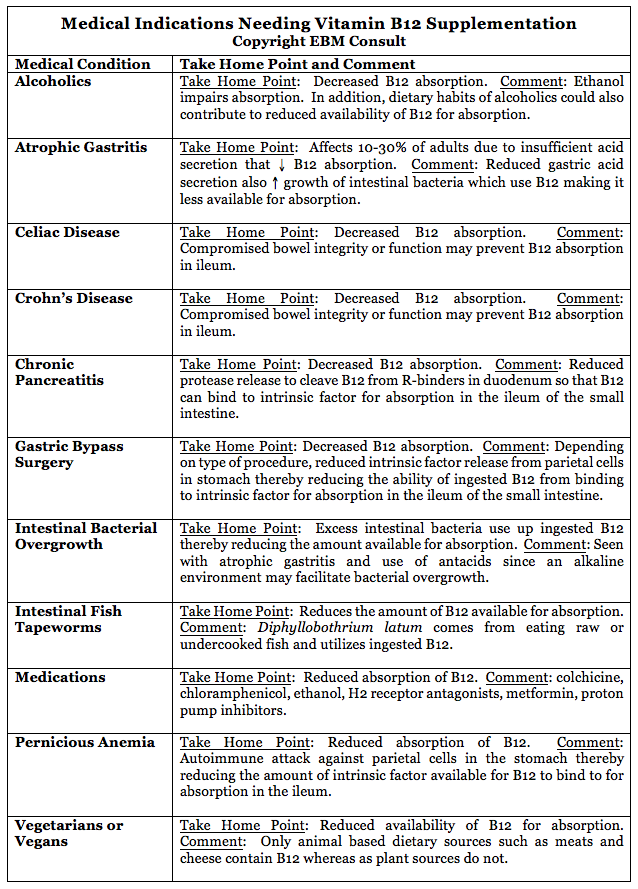The absorption of vitamin B12 (cobalamin,
cyanocobalamin) is dependent upon a number of anatomical and physiological
factors and is also necessary for a number of biological
reactions/functions. This article will focus on the type of patients or medical conditions
that may require the supplementation of vitamin B12 (see the table below).1-6
More importantly, it is necessary to recognize the reason that some of these
patients require supplementation, including those using vitamin B12 in
different dosage forms other than those to be taken by mouth.

While
having megaloblastic anemia, hyperhomocysteinemia, and/or neuropathy are not
medical conditions that influence vitamin B12 absorption, they are clearly
indications for the use of vitamin B12 supplements when deficiency is
established. Furthermore, it is likely that many of these medical
conditions will likely require the use of vitamin B12 supplements that bypass
the gastrointestinal tract. This would be especially true where there is
insufficient intrinsic factor produced and/or where the ileum of the small of
the intestine is no longer present or able to absorb the vitamin B12/intrinsic
factor complex. Currently, the only prescription options include
cobalamin delivered intranasally and delivered parenterally (as intramuscular
or deep subcutaneous injection).4,7 The intranasal products appear to be
well tolerated and are marketed under the brand names, CaloMist and
Nascobal. The initial and maintenance dose and frequency of
administration vary based on the degree of deficiency and medical situation
needing treated.
References:
- Institute of Medicine. Food and Nutrition Board. Dietary Reference
Intakes: Thiamin, Riboflavin, Niacin, Vitamin B6, Folate, Vitamin B12,
Pantothenic Acid, Biotin, and Choline. Washington, DC: National Academy
Press, 1998.
- National Institutes of Health. Office of Dietary
Supplements. Dietary Supplement Fact Sheet: Vitamin B12. Bethesda,
Maryland. 05/26/2010.
- Hurwitz A, Brady DA, Schaal SE et al. Gastric acidity in older adults. JAMA 1997;278:659-62.
- Butler
CC, Vidal-Alaball J, Cannings-John R et al. Oral vitamin B12 versus
intramuscular vitamin B12 for vitamin B12 deficiency: a systematic
review of randomized controlled trials. Fam Pract 2006;23:279-85.
- Sumner
AE, Chin MM, Abraham JL et al. Elevated methylmalonic acid and total
homocysteine levels show high prevalence of vitamin B12 deficiency after
gastric surgery. Ann Intern Med 1996;124:469-76.
- Brolin
RE, Gorman JH, Gorman RC et al. Are vitamin B12 and folate deficiency
clinically important after roux-en-Y gastric bypass? J Gastrointest Surg
1998;5:436-42.
- Suzuki
DM, Alagiakrishnan K, Masaki KH et al. Patient acceptance of
intranasal cobalamin gel for vitamin B12 replacement therapy. Hawaii Med
J 2006;65:311-4.


